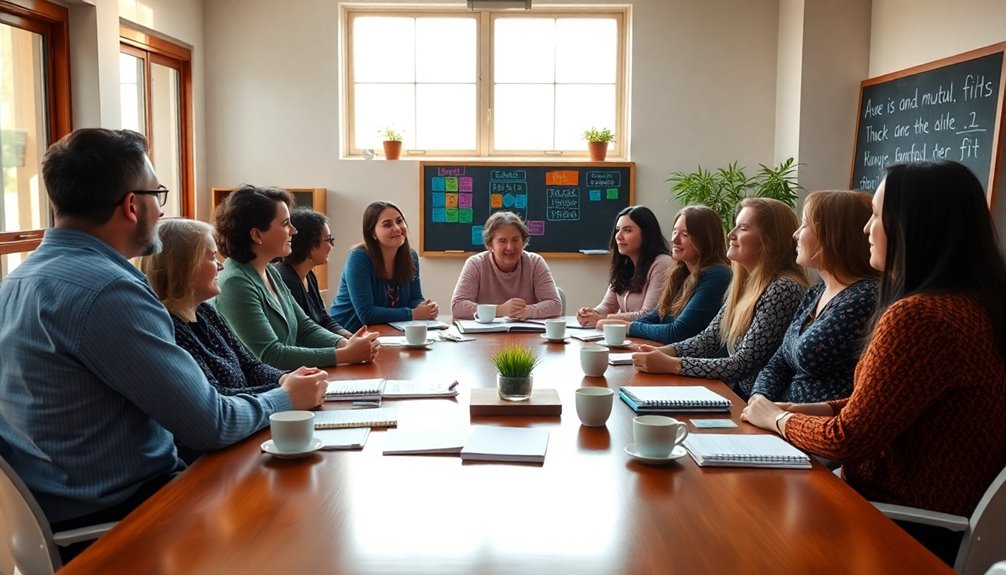When prepping for a teacher interview, it's essential to ask the right questions. Inquire about the school's support for teachers; this shows you're invested. Don't shy away from asking why the position is open or what qualities they seek in a candidate. Understanding the school's culture and challenges can help you assess if it's the right fit. Questions about mentoring programs and professional development reveal your interest in growth. Tailoring your queries to fit the school's mission makes you stand out. If you want more insights to nail your interview, there's plenty more to explore.
Key Takeaways
- Inquire about the reasons for the position opening to understand the school's needs and expectations.
- Ask what qualities the school values in a teacher to align your strengths with their requirements.
- Request a description of a typical day to gain insight into daily responsibilities and school environment.
- Explore the school's current challenges to assess the context in which you would be working.
- Investigate the support systems available for teachers, including mentoring and professional development opportunities.
Importance of Interview Preparation

When it comes to landing that teaching position, preparation is your best friend. You need to approach the interview with confidence, showcasing your passion for teaching and commitment to your students.
Think ahead and prepare a list of questions that reflect your interest in the role and the school. Tailor these questions as you learn more during the interview, making them thoughtful and relevant. This not only demonstrates your engagement but also helps you assess if the school aligns with your values.
Researching the School

Many candidates underestimate the importance of researching the school before an interview. Knowing the school's mission, values, and culture can set you apart and show your genuine interest.
Start by visiting the school's website to gather essential information about programs, achievements, and community involvement. Pay attention to recent news, challenges, and goals to ask informed questions.
Avoid asking about details easily found online, as this can signal a lack of preparation. Instead, focus on demonstrating how your teaching philosophy aligns with the school's approach.
Assessing Mutual Fit

Finding the right fit between you and the school is vital for a successful teaching experience. To assess this mutual fit, focus on the school's philosophy and teaching methods.
Ask about their approach to education and how it aligns with your personal teaching style and values. Inquire about the community's support and the school's culture, as these factors greatly influence your day-to-day experience.
Avoid questions centered solely on personal benefits; instead, seek understanding of the challenges the school faces and how you can contribute positively.
Broadening Your Questions

Broadening your questions during an interview can greatly enhance your understanding of the school's environment and culture. Instead of focusing solely on job duties, investigate into various aspects of the institution.
Ask about the support systems in place for teachers, such as mentoring programs and professional development opportunities. Explore the school's values by inquiring about its community involvement and current challenges.
You should also understand the classroom environment by asking about student demographics and technology availability. By diversifying your inquiries, you'll not only demonstrate your genuine interest but also gather valuable insights that help you assess whether this school aligns with your teaching philosophy and personal values.
Consider how the school's approach to supporting emotional well-being through its programs might impact both teachers and students. A well-rounded approach can make a significant difference in your interview experience.
Key Questions to Ask

Choosing the right questions to ask during a teacher interview can considerably impact your understanding of the position and the school environment. Focus on key inquiries that can reveal a lot about the school's culture and expectations. Here are some impactful questions to examine:
| Question | Purpose |
|---|---|
| Why is this position currently open? | Understand the school's needs |
| What qualities do you seek in a teacher? | Align your strengths with their needs |
| Can you describe a typical day here? | Get insight into daily responsibilities |
| What are the school's current challenges? | Assess the environment and goals |
| How does the school support teachers? | Gauge available resources and mentorship |
These questions will help you engage in meaningful dialogue and assess mutual fit. Additionally, understanding foster parent pay in your area can provide valuable context for considering the school's engagement with the community.
Understanding Support Systems

Support systems play an essential role in a teacher's success and overall job satisfaction. When you're interviewing, it's vital to understand the support available to you.
Consider asking about:
- Mentoring programs for new teachers
- District support for continued education
- The culture of collaboration among faculty
- Resources available for teachers
- Opportunities for professional development
These inquiries not only demonstrate your commitment to growth but also help you gauge how well the institution supports its educators.
Knowing the support systems in place can help you envision your future and guarantee you're stepping into an environment that values its teachers. Engaging in these discussions can lead to a more fulfilling teaching experience.
Classroom Environment Insights

When considering a teaching position, understanding the classroom environment is essential, as it directly impacts your teaching effectiveness and student engagement. You'll want to ask specific questions that reveal details about the classroom dynamics. Here's a helpful table to guide your inquiries:
| Aspect | Key Questions |
|---|---|
| Classroom Size | What's the average classroom size and student demographics? |
| Technology Availability | What classroom technology do you provide? |
| Teacher Input | How much input do teachers have in the curriculum? |
Engaging With the Community

Understanding how a school engages with its community can provide valuable insights into its culture and support systems.
When you're interviewing for a teaching position, it's essential to gauge this aspect. Active community involvement often reflects a supportive environment for both students and teachers.
Consider asking these questions:
- Is there an active PTA group?
- How does the school foster community support?
- What's the level of parental involvement in education?
- Are there partnerships with local organizations?
- How does the school engage with the surrounding community?
These inquiries will help you understand how the school values collaboration and support, ultimately shaping your teaching experience and impact on students.
Frequently Asked Questions
What Are the School's Core Values and Mission Statement?
You should ask about the school's core values and mission statement to gauge its commitment to education.
Understanding these elements helps you align your teaching philosophy with the school's vision.
It's essential to know how the institution prioritizes student development, community engagement, and academic excellence.
This insight not only shows your genuine interest but also helps you assess if the school's culture resonates with your personal values and teaching approach.
How Does the School Handle Faculty Conflicts or Disagreements?
Did you know that nearly 70% of teachers report experiencing conflict with colleagues at some point?
It's essential to ask how the school manages faculty conflicts or disagreements.
You'll want to know about their conflict resolution strategies, whether they promote open communication, and if they've a support system in place.
Understanding this will help you gauge the collaborative culture and how well conflicts are addressed within the school community.
What Strategies Are Used to Engage Students With Diverse Learning Needs?
To engage students with diverse learning needs, you'll likely implement differentiated instruction strategies.
You might incorporate varied teaching methods, like visual aids or hands-on activities, to cater to different learning styles.
Collaborating with special education staff can also enhance your approach.
Regular assessments will help you track progress and adjust your methods.
How Is Technology Integrated Into the Curriculum?
When it comes to integrating technology into the curriculum, you'll want to see how the school embraces the digital age.
You might ask about specific tools teachers use, like interactive platforms or educational software. It's important to find out how these technologies enhance learning experiences and engage students.
Also, don't forget to inquire about professional development for teachers, ensuring they stay up-to-date with tech trends and effectively implement them in the classroom.
What Role Do Teachers Play in School Governance or Decision-Making?
In your interview, ask about the role teachers play in school governance or decision-making.
Understanding how much influence educators have can reveal the school's commitment to collaboration and valuing teacher input.
You might inquire about opportunities for teachers to participate in committees or contribute to policy-making.
This insight can help you gauge whether the school fosters a supportive environment where your voice and expertise truly matter in shaping education.
Conclusion
To sum up, preparing for your teacher interview isn't just about impressing the panel; it's about finding the right fit for you. By asking thoughtful questions, you dive deeper into the school's culture and support systems, making connections that matter. You'll discover not only if you belong there but also how you can thrive in that environment. So, embrace this opportunity, ask away, and let the conversation unfold—it might just lead you to your dream teaching position.









